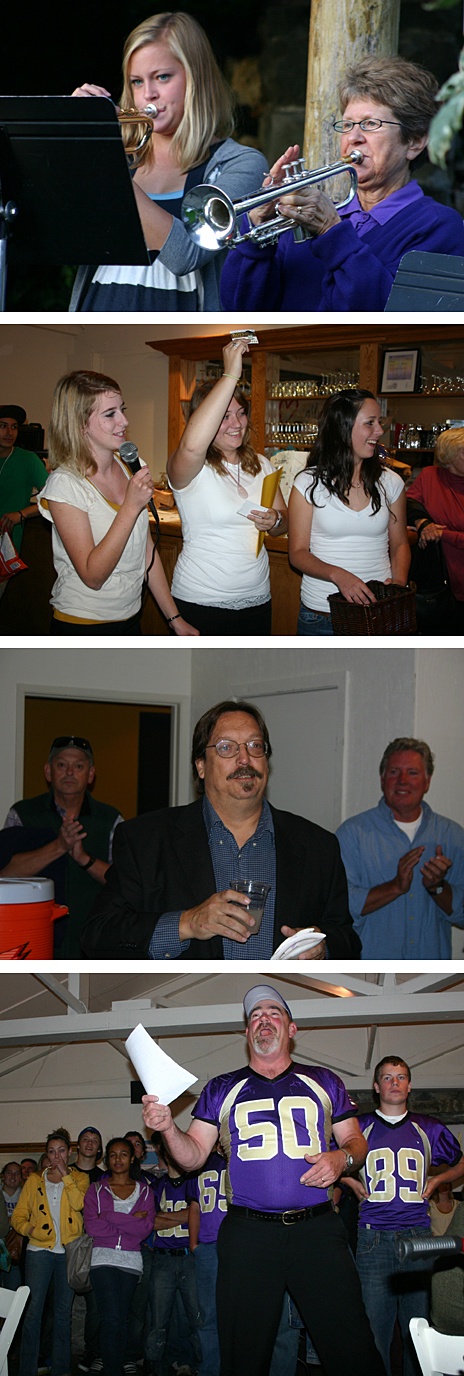The love was thicker than the lasagna, sweeter than the dessert brownies.
And the man of the hour, Greg Sawyer – known as much for his play by play coverage of high school football games as he is teaching – was speechless.
“It’s kind of overwhelming,” Sawyer said as he arrived to the Friday Harbor High School Jazz Band’s version of “Vehicle” by Blood, Sweat & Tears.
Islanders packed the Roche Harbor Pavilion and outdoor banquet court Friday to show support for Sawyer, who needs a kidney transplant. The event raised more than $17,000 to help defray his costs. But it did much more than that.
The event showed that three teens with spirit can move mountains. The event was the brainchild of Catherine Bevens, Genevieve Iverson and Hannah Waite. Hannah’s father, high school counselor Gordy Waite, was a kidney transplant recipient in 2001.
Catherine, Genevieve and Hannah organized the event, applied for a Gates grant to cover the cost of food and promotion, collected donations, and enlisted the help of Roche Harbor, which provided the venue, and Purple & Gold.
It proved the generosity of the community. No one in the room Friday was untouched by the Great Recession. But they still reached deep, paying $15 a ticket to get in, buying raffle tickets, and bidding on silent and live auction items.
“We are so supportive of each other,” Jeff Iverson, Genevieve’s father, said. “It’s a close-knit community. Where else can you go where if you walk downtown or walk to the ferry landing, you know everybody? We’re one great big family.”
School board president Boyd Pratt added, “It’s the island community we’re in. We care for each other. It goes beyond a professional relationship. This is a bunch of friends getting together.”
And the event educated people about kidneys and transplants. Catherine, Genevieve and Hannah decorated the pavilion with information posters. And guest speakers Gordy Waite and John Sandifer, one a recipient and the other a donor, spoke about what happens physically – and emotionally – when someone experiences what they experienced.
Sandifer comes from a family of recipients and donors. He donated a kidney to his sister about five years ago; their mother had donated a kidney first, but the transplant was unsuccessful. The brother-to-sister transplant worked. The same scenario happened in a brother-in-law’s family.
Sandifer said the body functions well with one kidney and, surprisingly, many people are born with one kidney – a fact he learned during testing. He said one of the first tests a potential donor undergoes is to determine how many kidneys he or she has.
Gordy Waite said that he was diagnosed with chronic kidney failure in August 1988, two months after he and Sally were married. By 2000, he was told he had to get a transplant.
“It was amazing how the community and my colleagues came to my support,” he said. “I was on prayer lists at churches … the support helped me heal faster and come home faster to the island.”
Waite’s mother, then 67, insisted on being the donor. She went into surgery a half-hour before he did, and the surgery itself took about 10 hours.
“I always say that she gave me life twice – when I was born, and when she gave me another chance at life,” he said.
The kidneys are filters for the body, removing such wastes as ammonium and urea which are excreted through urine. The kidneys also are responsible for the reabsorption of amino acids and glucose, and are important in the production of vitamin D and necessary enzymes and hormones.
Sawyer said he was diagnosed with an immune system disorder six or seven years ago. He is fatigued. He will soon start doing dialysis daily while he waits for a kidney – either from a donor who has died, or a living donor. A kidney from a living donor is preferred because there is less chance of the body rejecting it.
He will undergo the transplant at University of Washington Medical Center. The wait for a kidney could take one to two years. His kidney must be blood type A or O. He said his insurance coverage will pay the donor’s costs – from testing to surgery to recovery.
Assistant football coach Shannon Plummer, his Wolverine charges by his side, debuted as an auctioneer and with humor and good-natured prodding helped generate about $5,000 in the live auction. Robin Jacobson bid $600 for a work party of football players; Plummer got a matching bid from Stephen Brandli for another work party.
Islanders bid on 12 items, including a cord of wood, desserts, island-grown (or caught or raised) foods, an heirloom-quality quilt, and weekend stays at cabins in Griffin Bay and Stuart Island, at Mount Baker and in Winthrop.
Sawyer stayed low-key through the evening, visiting well-wishers in the back of the room, but he couldn’t escape a standing ovation that followed tributes from the young event organizers.
“You’re an amazing person in our life and we care about you very much,” Genevieve Iverson said.



